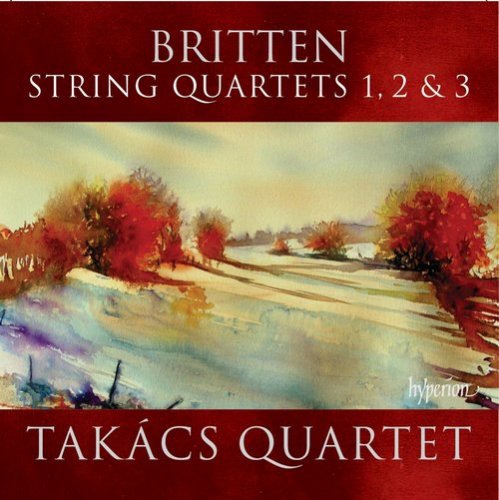
Takács Quartet - Benjamin Britten: String Quartets 1, 2 & 3 (2013)
BAND/ARTIST: Takács Quartet
- Title: Benjamin Britten: String Quartets 1, 2 & 3
- Year Of Release: 2013
- Label: Hyperion
- Genre: Classical
- Quality: FLAC (image+.cue,log,scans)
- Total Time: 01:15:48
- Total Size: 379 Mb
- WebSite: Album Preview
Tracklist:
Benjamin Britten (1913-1976)
[1]-[4] String Quartet No.1 in D major, Op.25 (1941)
[5]-[7] String Quartet No.2 in C major, Op.36 (1945)
[8]-[12] String Quartet No.3, Op.94 (1975)
Performers:
Takács Quartet
Edward Dusinberre, violin
Károly Schranz, violin
Geraldine Walther, viola
András Fejér, cello
Benjamin Britten (1913-1976)
[1]-[4] String Quartet No.1 in D major, Op.25 (1941)
[5]-[7] String Quartet No.2 in C major, Op.36 (1945)
[8]-[12] String Quartet No.3, Op.94 (1975)
Performers:
Takács Quartet
Edward Dusinberre, violin
Károly Schranz, violin
Geraldine Walther, viola
András Fejér, cello
Benjamin Britten's string quartets, although stylistically of a piece with his other music, are rather thorny works, lacking the extramusical references that are generally central to his musical language. They seem inward, mysterious. The last two of the three official quartets (there were also some youthful works) end with sizable contrapuntal movements that it's hard to get an emotional fix on; the last work, written in 1975 a year before Britten's death, is a sort of valediction for his career. What this music needs is not "interpretation," but straightforward and expert playing, and that's just what it gets here from the Takács Quartet, which played these quartets in an enthusiastically received recital in London and then soon afterward recorded them, with the Wyastone Estate concert hall so beloved of Hyperion's engineers providing an ideal sonic backdrop. Hear the opening of the first quartet, composed in the U.S. in 1941, for an example of both the recording's interpretive virtues and its sonic ones. The extended combination of high, dissonant tones in the violins and viola with cello pizzicatos rings out beautifully in the concert hall and serves notice that although the quartet is in D major and has four movements, its structure will be anything but conventional. The Takács executes this difficult sound cleanly and does not overdo it, letting the music speak for itself. So it goes through the Purcell-influenced String Quartet No. 2 in C major , Op. 36 (1945), and then often-transcendent String Quartet No. 3, Op. 94. Recommended, and likely to support the argument that these works should be heard in quartet recitals more often than they are.
Classical | FLAC / APE | CD-Rip
As a ISRA.CLOUD's PREMIUM member you will have the following benefits:
- Unlimited high speed downloads
- Download directly without waiting time
- Unlimited parallel downloads
- Support for download accelerators
- No advertising
- Resume broken downloads


